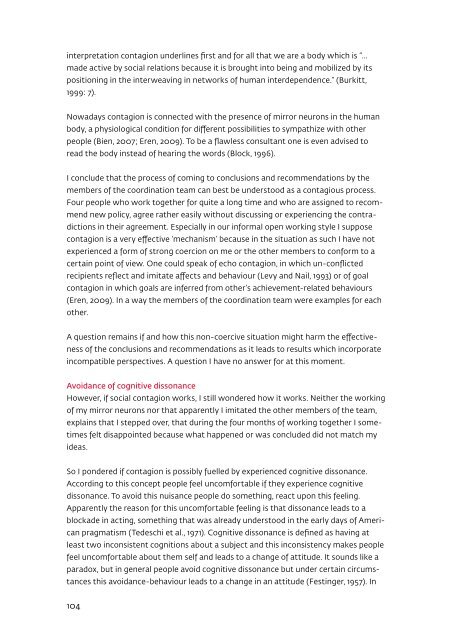Rumbling on performativity_Frits Simon
Rumbling on performativity_Frits Simon
Rumbling on performativity_Frits Simon
Create successful ePaper yourself
Turn your PDF publications into a flip-book with our unique Google optimized e-Paper software.
interpretati<strong>on</strong> c<strong>on</strong>tagi<strong>on</strong> underlines first and for all that we are a body which is “...<br />
made active by social relati<strong>on</strong>s because it is brought into being and mobilized by its<br />
positi<strong>on</strong>ing in the interweaving in networks of human interdependence.” (Burkitt,<br />
1999: 7).<br />
Nowadays c<strong>on</strong>tagi<strong>on</strong> is c<strong>on</strong>nected with the presence of mirror neur<strong>on</strong>s in the human<br />
body, a physiological c<strong>on</strong>diti<strong>on</strong> for different possibilities to sympathize with other<br />
people (Bien, 2007; Eren, 2009). To be a flawless c<strong>on</strong>sultant <strong>on</strong>e is even advised to<br />
read the body instead of hearing the words (Block, 1996).<br />
I c<strong>on</strong>clude that the process of coming to c<strong>on</strong>clusi<strong>on</strong>s and recommendati<strong>on</strong>s by the<br />
members of the coordinati<strong>on</strong> team can best be understood as a c<strong>on</strong>tagious process.<br />
Four people who work together for quite a l<strong>on</strong>g time and who are assigned to recommend<br />
new policy, agree rather easily without discussing or experiencing the c<strong>on</strong>tradicti<strong>on</strong>s<br />
in their agreement. Especially in our informal open working style I suppose<br />
c<strong>on</strong>tagi<strong>on</strong> is a very effective ‘mechanism’ because in the situati<strong>on</strong> as such I have not<br />
experienced a form of str<strong>on</strong>g coerci<strong>on</strong> <strong>on</strong> me or the other members to c<strong>on</strong>form to a<br />
certain point of view. One could speak of echo c<strong>on</strong>tagi<strong>on</strong>, in which un-c<strong>on</strong>flicted<br />
recipients reflect and imitate affects and behaviour (Levy and Nail, 1993) or of goal<br />
c<strong>on</strong>tagi<strong>on</strong> in which goals are inferred from other’s achievement-related behaviours<br />
(Eren, 2009). In a way the members of the coordinati<strong>on</strong> team were examples for each<br />
other.<br />
A questi<strong>on</strong> remains if and how this n<strong>on</strong>-coercive situati<strong>on</strong> might harm the effectiveness<br />
of the c<strong>on</strong>clusi<strong>on</strong>s and recommendati<strong>on</strong>s as it leads to results which incorporate<br />
incompatible perspectives. A questi<strong>on</strong> I have no answer for at this moment.<br />
Avoidance of cognitive diss<strong>on</strong>ance<br />
However, if social c<strong>on</strong>tagi<strong>on</strong> works, I still w<strong>on</strong>dered how it works. Neither the working<br />
of my mirror neur<strong>on</strong>s nor that apparently I imitated the other members of the team,<br />
explains that I stepped over, that during the four m<strong>on</strong>ths of working together I sometimes<br />
felt disappointed because what happened or was c<strong>on</strong>cluded did not match my<br />
ideas.<br />
So I p<strong>on</strong>dered if c<strong>on</strong>tagi<strong>on</strong> is possibly fuelled by experienced cognitive diss<strong>on</strong>ance.<br />
According to this c<strong>on</strong>cept people feel uncomfortable if they experience cognitive<br />
diss<strong>on</strong>ance. To avoid this nuisance people do something, react up<strong>on</strong> this feeling.<br />
Apparently the reas<strong>on</strong> for this uncomfortable feeling is that diss<strong>on</strong>ance leads to a<br />
blockade in acting, something that was already understood in the early days of American<br />
pragmatism (Tedeschi et al., 1971). Cognitive diss<strong>on</strong>ance is defined as having at<br />
least two inc<strong>on</strong>sistent cogniti<strong>on</strong>s about a subject and this inc<strong>on</strong>sistency makes people<br />
feel uncomfortable about them self and leads to a change of attitude. It sounds like a<br />
paradox, but in general people avoid cognitive diss<strong>on</strong>ance but under certain circumstances<br />
this avoidance-behaviour leads to a change in an attitude (Festinger, 1957). In<br />
104



